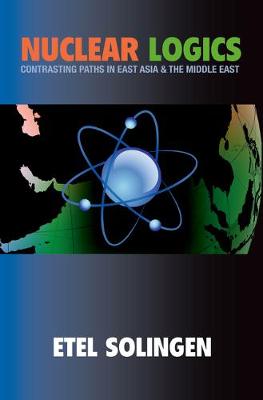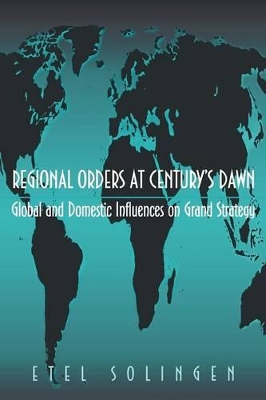Princeton Studies in International History and Politics
3 total works
"Nuclear Logics" examines why some states seek nuclear weapons while others renounce them. Looking closely at nine cases in East Asia and the Middle East, Etel Solingen finds two distinct regional patterns. In East Asia, the norm since the late 1960s has been to forswear nuclear weapons, and North Korea, which makes no secret of its nuclear ambitions, is the anomaly. In the Middle East the opposite is the case, with Iran, Iraq, Israel, and Libya suspected of pursuing nuclear-weapons capabilities, with Egypt as the anomaly in recent decades. Identifying the domestic conditions underlying these divergent paths, Solingen argues that there are clear differences between states whose leaders advocate integration in the global economy and those that reject it. Among the former are countries like South Korea, Taiwan, and Japan, whose leaders have had stronger incentives to avoid the political, economic, and other costs of acquiring nuclear weapons. The latter, as in most cases in the Middle East, have had stronger incentives to exploit nuclear weapons as tools in nationalist platforms geared to helping their leaders survive in power.
Solingen complements her bold argument with other logics explaining nuclear behavior, including security dilemmas, international norms and institutions, and the role of democracy and authoritarianism. Her account charts the most important frontier in understanding nuclear proliferation: grasping the relationship between internal and external political survival. "Nuclear Logics" is a pioneering book that is certain to provide an invaluable resource for researchers, teachers, and practitioners while reframing the policy debate surrounding nonproliferation.
Solingen complements her bold argument with other logics explaining nuclear behavior, including security dilemmas, international norms and institutions, and the role of democracy and authoritarianism. Her account charts the most important frontier in understanding nuclear proliferation: grasping the relationship between internal and external political survival. "Nuclear Logics" is a pioneering book that is certain to provide an invaluable resource for researchers, teachers, and practitioners while reframing the policy debate surrounding nonproliferation.
Etel Solingen provides a comprehensive explanation of foreign policy based on how states throughout the world have confronted the rapid emergence of a global economy and international institutions. A major advance in international relations theory, Regional Orders at Century's Dawn skillfully uses a key issue--internationalization--to clarify other recent debates, from the notion of a democratic peace to the relevance of security dilemmas, nationalism, and the impact of international institutions. The author discusses in rich detail the Middle East, Latin America's Southern Cone, and the Korean peninsula, and builds on examples drawn from almost every other region of the world. As Solingen demonstrates, economic liberalization--with its dramatic political and economic consequences--invariably attracts supporters and detractors, who join in coalitions to advance their agendas. Each coalition's agenda, or "grand strategy," has consequences at all levels: domestic, regional, and international. At home, coalitions struggle to define the internal allocation and management of resources, and to undermine their rivals.
Throughout their regional neighborhoods, coalitions opposing internationalization often compete for dominance, sometimes militarily. Coalitions favoring internationalization, instead, often cooperate. At the global level, each coalition finds support for its "grand strategies" from different international institutions and from competing global economic trends. Solingen's concept of "grand strategy" proposes more than a theory of foreign policy and explains the role of nationalism and ethno-religious revivalism in the politics of liberalization.
Throughout their regional neighborhoods, coalitions opposing internationalization often compete for dominance, sometimes militarily. Coalitions favoring internationalization, instead, often cooperate. At the global level, each coalition finds support for its "grand strategies" from different international institutions and from competing global economic trends. Solingen's concept of "grand strategy" proposes more than a theory of foreign policy and explains the role of nationalism and ethno-religious revivalism in the politics of liberalization.
Nuclear Logics: Contrasting Paths in East Asia and the Middle East
by Etel Solingen
Published 1 January 2009


